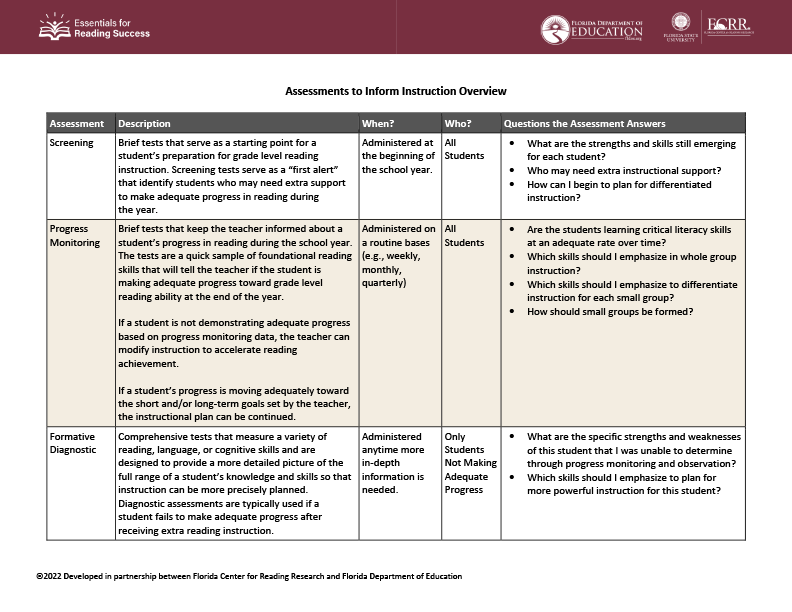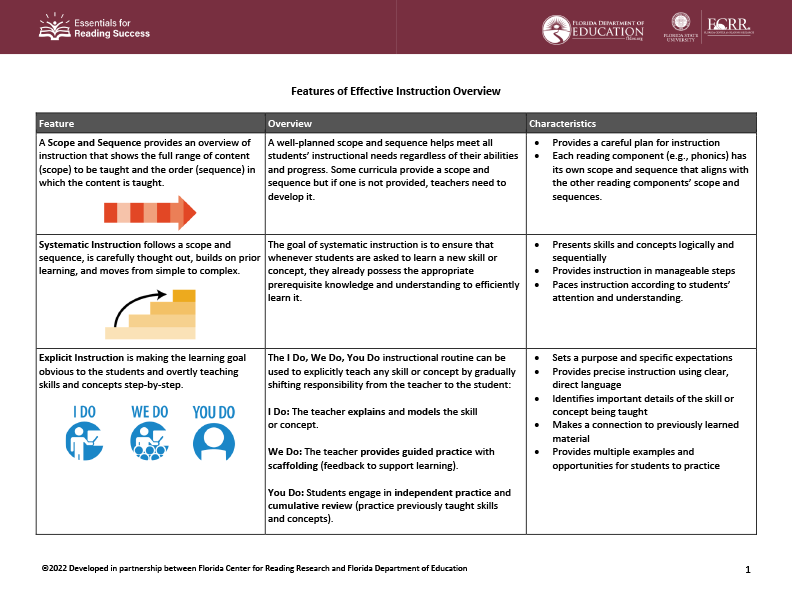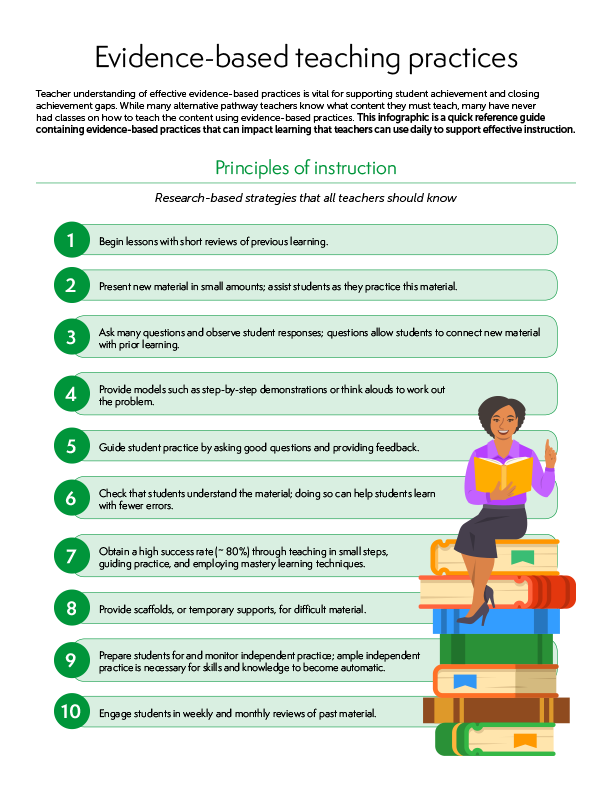The Florida Department of Education’s Practice Profiles clearly define the best practices of core reading instruction in a way that is teachable, learnable, doable, and assessable in practice. These practice profiles are research-based, aligned to effective reading instruction, and related to Florida’s Benchmarks for Excellent Student Thinking (B.E.S.T.) Standards.
Review the practice profiles below. Each includes the definition and an example of accomplished use and ineffective use for five profiles: explicit instruction, systematic instruction, scaffolded instruction, corrective feedback, and differentiated instruction. Videos of instructional examples for “accomplished use” in the classroom are also provided for the profiles.
For more information about practice profiles, visit https://www.fldoe.org.
Definition
EXPLICIT INSTRUCTION is intentional teaching with a clear and direct presentation of new information to learners, which does not require student inferencing during the introduction of new or previously taught content, concepts or skills. One example is the gradual release model.Accomplished Use
Grades K-5
- Introduces the new or previously taught content, concept or skill clearly and directly.
- Models or demonstrates use of the new or previously taught content, concept or skill.
- Provides clear visual and/or auditory examples (and non-examples when needed) to illustrate specific application of content, concept or skill.
- Provides learners frequent opportunities for guided and independent practice of new or previously taught content, concept or skill.
Grades 6-12
- Teacher will communicate goals and expectations for student learning.
- Teacher will provide clear explanations of goals and expectations for student learning.
- Teacher will model or demonstrate, providing examples and non- examples.
- Teacher will provide opportunities for student practice with guidance.
Ineffective Use
Grades K-5
- Introduces new or previously taught content, concept or skill indirectly, relying upon student inferencing; does not provide clear and concise explanation.
- Provides instruction without modeling or demonstrating new or previously taught content, concepts or skills; does not clarify potential misconceptions.
- Provides instruction without visual and/or auditory examples and non-examples; does not illustrate specific application of new or previously taught content, concepts or skills.
- Provides instruction without follow-up opportunity for learners to practice new or previously taught content, concepts or skills; does not guide learners toward independence as soon as possible.
Grades 6-12
- Teacher indirectly communicates goals and expectations for student learning.
- Teacher provides explanations of goals and expectations that are unclear.
- Teacher models or demonstrates but does not provide clear examples and nonexamples.
- Teacher provides opportunities for student practice without guidance.
See instructional examples of “accomplished use” in the classroom
Video 18: Word Building from Institute of Education Sciences.
This video depicts a teacher explicitly teaching word-building using sound boxes and letter-tiles with a small group of first graders (5:45).
Definition
SYSTEMATIC INSTRUCTION is a planned sequence that includes a logical progression of content, concepts and skills, from simple to complex, with cumulative teaching/review and practice to enable learners to achieve learning goals.Accomplished Use
Grades K-5
- Uses a logical progression of content, concept and skill, proceeding from simple to more complex.
- Conducts a cumulative review, enabling learners to make connections to previously learned material.
- Provides opportunities for students to practice previously taught content, concepts, and skills to progress toward learning goals.
Grades 6-12
- Teacher will activate the student’s prior knowledge.
- Teacher conducts a cumulative review, enabling learners to make connections to previously learned material.
- Teacher uses a logical progression of content, concept and skill, proceeding from simple to more complex.
- Teacher will provide multiple and varied opportunities for student practice.
Ineffective Use
Grades K-5
- Teaches content, concepts or skills that do not proceed from simple to more complex.
- Does not provide cumulative reviews for learners to build content, concepts and skills or make connections to new and previously learned material.
- Does not provide opportunities for learners to practice new and previously taught content, concepts and skills in order to progress toward learning goals.
Grades 6-12
- Teacher provides instruction without activating the student’s prior knowledge.
- Teacher does not conduct a cumulative review, preventing learners from making connections to previously learned material.
- Teacher does not use a logical progression of content, concept and skill, proceeding from simple to more complex.
- Teacher does not provide multiple and varied opportunities for student practice.
See instructional examples of “accomplished use” in the classroom
Video 17: Word Building from Institute of Education Sciences.
This video depicts a whole group of K/1 students engaging in a phonemes linked to letters activity using letter-sound cards, mini-whiteboards, and markers (5:03). The teacher proceeds from simple (identifying letter-sounds) to complex (using those letter-sounds to write and read words). Learners have opportunities to practice letter sounds previously taught (cumulative review).
Definition
SCAFFOLDED INSTRUCTION is the intentional support provided by a teacher for learners to carry out a task or solve a problem, to achieve a goal that they could not do without support. It is temporary support matched to the current understanding or skill level of learners. The intent is to provide a decreasing level of support until learners are empowered to perform independently.Accomplished Use
Grades K-5
- Identifies learners who are having difficulty carrying out a task or solving a problem on their own.
- Provides intentional support matched to the learner’s need, such as asking an open-ended question, providing prompts and cues, breaking down the problem into smaller steps, using visual aids, providing an example or offering encouragement.
- Monitors the learner’s response to the scaffold and provides the next level of support needed on a scale from intense to moderate, gradually releasing ownership of learning to the student until they are able to perform the task independently.
Grades 6-12
- Teacher uses formative assessments to identify the student’s need and adjusts support based on the student’s response.
- Teacher uses temporary written or verbal prompts, tools or resources to provide appropriate support (think alouds, cue cards, checklists, examples).
- Teacher engages students in interactive, content-centered learning (dialogue, exchange of ideas, opportunities to question and clarify).
- Teacher intentionally and gradually decreases support and transfers responsibility to students as self- sufficiency is developed (I do–we do–you do).
Ineffective Use
Grades K-5
- Overlooks learners having difficulty carrying out a task or solving a problem on their own.
- Does not provide appropriate support that relates to the needs of the learner.
- Does not monitor learner response to scaffolding; does not identify next level of requisite support for further learning; does not empower the learner to perform the task independently.
Grades 6-12
- Teacher uses formative assessments to identify the student’s need but does not adjust support based on the student’s response.
- Teacher does not use temporary written or verbal prompts, tools or resources to provide appropriate support (think alouds, cue cards, checklists, examples).
- Teacher does not engage students in interactive, content-centered learning (dialogue, exchange of ideas, opportunities to question and clarify).
- Teacher intentionally and gradually decreases support but does not transfer responsibility to students as self- sufficiency is developed (I do–we do–you do).
See instructional examples of “accomplished use” in the classroom
Video 38: Word Building from Institute of Education Sciences.
This video depicts a third-grade small group engaging in an alternated reading activity to practice reading fluency (5:26). Notice how the teacher scaffolds instruction at :56, 2:10, 2:55, 4:20, and 4:52.
Definition
CORRECTIVE FEEDBACK is clearly communicated, timely, and developmentally appropriate information aligned to learning goals or objectives that specifically addresses learners’ errors or misconceptions. It is one type of ongoing instructional feedback.Accomplished Use
Grades K-5
- Identifies learner’s misunderstanding/error relative to the target instructional goal.
- Communicates immediate/timely feedback clearly using student-friendly language.
- Provides the learner the opportunity for timely self-correction.
- Repeats the process as needed or confirms accuracy based on learner response.
Grades 6-12
- Teacher identifies the student’s misunderstanding or error relative to the target instructional goal.
- Teacher communicates feedback clearly and in a timely manner using student-friendly language.
- Teacher provides students the opportunity for timely self- correction.
- The teacher repeats the process as needed or confirms accuracy based on the learner’s response
Ineffective Use
Grades K-5
- Overlooks learner’s misunderstanding/error relative to the target instructional goal.
- Provides no feedback to learner response.
- Provides the learner no opportunity for self-correction.
- Provides no confirmation or follow-up correction of the learner’s accurate or inaccurate response.
Grades 6-12
- Teacher does not identify the student’s misunderstanding or error relative to the target instructional goal.
- Teacher communicates immediate feedback but does not provide it in student-friendly language.
- Teacher does not provide students with an opportunity for timely self-correction.
- The teacher repeats the process but does not confirm accuracy based on the learner’s response.
See instructional examples of “accomplished use” in the classroom
Video 10: Word Building from Institute of Education Sciences.
This video depicts a small group of kindergarten students engaging in a sentence segmentation activity using manipulatives (5:16). Notice how the teacher provides corrective feedback at 3:09 and 4:13.
Definition
DIFFERENTIATED INSTRUCTION is adapting instruction in response to the distinct assessed skills and needs of individual learners in order to increase their access and opportunities to meet specific learning goals.Accomplished Use
Grades K-5
- Delivers individualized instruction using one or more of the following adaptations to meet specific learning needs of each learner or group of learners: the content (what is taught), process (how learning is structured), product (what is produced and assessed) and/or the physical learning environment.
- Monitors the ongoing understandings and progress toward meeting specific learning goals to determine further adaptations.
Grades 6-12
- Teacher creates flexible structures and routines that allow for differentiation.
- Teacher delivers instruction that is adapted through content, process and/or product in order to meet individual student learning needs.
- Teacher monitors student understanding and progress toward meeting targeted learning goals on a continued basis.
Ineffective Use
Grades K-5
- Delivers generalized instruction using none of the following adaptations: content, process, product or physical environment; does not address specific needs of individual learners or groups of learners.
- Does not monitor learner’s ongoing understandings and progress toward meeting specific learning goals to determine further adaptations.
Grades 6-12
- Teacher creates flexible structures and routines that do not allow for differentiation.
- Teacher delivers instruction that is adapted through content, process and/or product but does not meet individual student learning needs.
- Teacher does not monitor student understanding and progress toward meeting targeted learning goals on a continued basis.
See instructional examples of “accomplished use” in the classroom
Video 29: Decodable Words in Isolation and in Text from Institute of Education Sciences.
This video shows a first-grade teacher differentiating instruction with a small group of students who needed extra instruction and practice with the long e sound represented by the sound-spelling patterns ea and ee (7:43). Throughout the lesson, the teacher helps students practice reading ea and ee in multiple kinds of activities and formats. Notice how students practice reading single words (0:54), word lists (3:11), and connected text (4:10), sometimes aloud with their peers and sometimes independently. Notice how the teacher also checks for each student’s understanding throughout the lesson, like when the group discussed the ee and ea words they found (5:10) and the sounds owls make (6:50) in the story, Up in the Trees.
Assessment is the process of collecting data to determine the strengths and weaknesses of each student and to guide next steps for instruction. Assessment can inform instruction because it provides information about important foundational reading skills. Assessment may be formal or informal and is conducted through a variety of methods: record reviews, interviews, observations, and testing.
Collecting informal assessment data throughout the school year helps to determine how to plan instruction, how to group students for small-group instruction, which students need individual support, and whether instruction is meeting students’ needs. There are three types of formative assessments that are typically used to inform instruction: screening, progress monitoring, and formative diagnostic tests.
Research has identified features of effective instruction that work in combination and are the basis of high quality reading instruction. Effective instruction includes a scope and sequence and is systematic, explicit, scaffolded, and differentiated. These features of effective instruction benefit all students.
This infographic is a quick reference guide containing evidence-based practices that can impact learning that teachers can use daily to support effective instruction.




